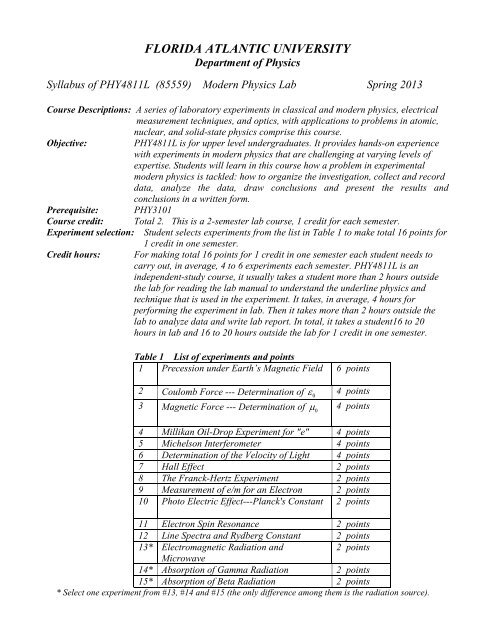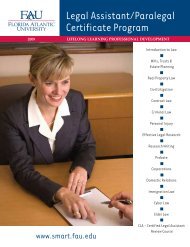PHY4811L - Florida Atlantic University
PHY4811L - Florida Atlantic University
PHY4811L - Florida Atlantic University
You also want an ePaper? Increase the reach of your titles
YUMPU automatically turns print PDFs into web optimized ePapers that Google loves.
FLORIDA ATLANTIC UNIVERSITY<br />
Department of Physics<br />
Syllabus of <strong>PHY4811L</strong> (85559) Modern Physics Lab Spring 2013<br />
Course Descriptions: A series of laboratory experiments in classical and modern physics, electrical<br />
measurement techniques, and optics, with applications to problems in atomic,<br />
nuclear, and solid-state physics comprise this course.<br />
Objective: <strong>PHY4811L</strong> is for upper level undergraduates. It provides hands-on experience<br />
with experiments in modern physics that are challenging at varying levels of<br />
expertise. Students will learn in this course how a problem in experimental<br />
modern physics is tackled: how to organize the investigation, collect and record<br />
data, analyze the data, draw conclusions and present the results and<br />
conclusions in a written form.<br />
Prerequisite: PHY3101<br />
Course credit: Total 2. This is a 2-semester lab course, 1 credit for each semester.<br />
Experiment selection: Student selects experiments from the list in Table 1 to make total 16 points for<br />
1 credit in one semester.<br />
Credit hours: For making total 16 points for 1 credit in one semester each student needs to<br />
carry out, in average, 4 to 6 experiments each semester. <strong>PHY4811L</strong> is an<br />
independent-study course, it usually takes a student more than 2 hours outside<br />
the lab for reading the lab manual to understand the underline physics and<br />
technique that is used in the experiment. It takes, in average, 4 hours for<br />
performing the experiment in lab. Then it takes more than 2 hours outside the<br />
lab to analyze data and write lab report. In total, it takes a student16 to 20<br />
hours in lab and 16 to 20 hours outside the lab for 1 credit in one semester.<br />
Table 1 List of experiments and points<br />
1 Precession under Earth’s Magnetic Field<br />
2 Coulomb Force --- Determination of 0<br />
3 Magnetic Force --- Determination of 0<br />
6 points<br />
4 points<br />
<br />
4 points<br />
4 Millikan Oil-Drop Experiment for "e" 4 points<br />
5 Michelson Interferometer 4 points<br />
6 Determination of the Velocity of Light 4 points<br />
7 Hall Effect 2 points<br />
8 The Franck-Hertz Experiment 2 points<br />
9 Measurement of e/m for an Electron 2 points<br />
10 Photo Electric Effect---Planck's Constant 2 points<br />
11 Electron Spin Resonance 2 points<br />
12 Line Spectra and Rydberg Constant 2 points<br />
13* Electromagnetic Radiation and<br />
Microwave<br />
2 points<br />
14* Absorption of Gamma Radiation 2 points<br />
15* Absorption of Beta Radiation 2 points<br />
* Select one experiment from #13, #14 and #15 (the only difference among them is the radiation source).
Table 2 Lab Schedule<br />
Date Total (accumulated) points to be finished<br />
1/5---1/27 4 points<br />
1/28---2/22 8 points<br />
2/25---3/22 12 points<br />
3/25---4/12 16 points<br />
Lab room: Room 125 Physical Science Bldg.<br />
Instructor: Behzad Khajavi Office: Room 330 Science Bldg.<br />
Email: bkhajavi@fau.edu Phone: (561) 526-3061<br />
Technic support: Jim Di Siena Working hour: 8:00 – 10:30 AM on T,W,R,F<br />
Office: Room 146 Physical Science Bldg.<br />
Email: sdisiena@fau.edu, Phone: (561) 827-8341<br />
Lab Director: Dr. De Haui Chen Office: Room 129 Physical Science Bldg.<br />
Email: dchen@fau.edu Phone: (561) 297-1088<br />
Lab manual: Get lab manual from Jim Di Siena<br />
Lab performance: Contact Behzad Khajavi or Jim Di Siena to schedule your lab time. Students<br />
should do the experiments by themselves. Behzad will make a brief introduction to<br />
the experiment and equipment. Students should do most of the experiments individually,<br />
this means that each student should have his/her own raw data. Students should do<br />
some of the experiments in group (of two people) such as “Precession under Earth’s<br />
Magnetic Field” and “Determination of the Velocity of Light”. Students can get help<br />
from Behzad Khajavi or Dr. Chen for difficult physics problems. Students can also get<br />
technic support from Jim Di Siena for equipment problems.<br />
Lab report and grade:<br />
Students are expected to write lab reports individually even the experiment<br />
is done in group.. Lab reports copied from others including scanned pages from lab<br />
manuals are unacceptable.<br />
Each lab report will be graded in a 20-point scale as shown in Table 3. Final<br />
Grade is the average grade of all required lab reports.<br />
Table 3 Grading scale of lab reports<br />
A 19.0---20 A- 18.0---19.0<br />
B+ 17.0---18.0 B 16.0---17.0 B- 15.0---16.0<br />
C+ 14.0---15.0 C 13.0---14.0 C- 12.0---13.0<br />
D+ 11.0---12.0 D 10.0---11.0 D- 9.0 ---10.0<br />
F < 9.0<br />
Lab reports should be turned in by the deadlines listed in Table 2. Points will be<br />
deducted for the late lab reports: One week late - one point, Two weeks late - three<br />
points. Three weeks or more late -ten points.<br />
A suggested format for a lab report is as follows.<br />
(a) Title of experiment, date of experiment, report date, your name (and your<br />
partners’ name if the experiment is done in group).<br />
(b) The purpose of the experiment.<br />
(c) A short summary of the theory underlying the experiment.<br />
(d) Presentation of your results includes your raw data, table, graphs,<br />
further calculations from the raw data, comparison between the<br />
experimental and theoretical results, and the error analysis of the data.<br />
(e) The conclusions.
Disability policy statement: In compliance with the Americans with Disabilities Act (ADA), students who<br />
require special accommodation due to a disability to properly execute coursework must register with the<br />
Office for Students with Disabilities (OSD) -- SU 133 (561-297-3880).<br />
Code of Academic Integrity policy statement: Students at <strong>Florida</strong> <strong>Atlantic</strong> <strong>University</strong> are expected to<br />
maintain the highest ethical standards. Academic dishonesty is considered a serious breach of these ethical<br />
standards, because it interferes with the university mission to provide a high quality education in which no<br />
student enjoys an unfair advantage over any other. Academic dishonesty is also destructive of the university<br />
community, which is grounded in a system of mutual trust and places high value on personal integrity and<br />
individual responsibility. Harsh penalties are associated with academic dishonesty. For more information,<br />
see <strong>University</strong> Regulation 4.001.











